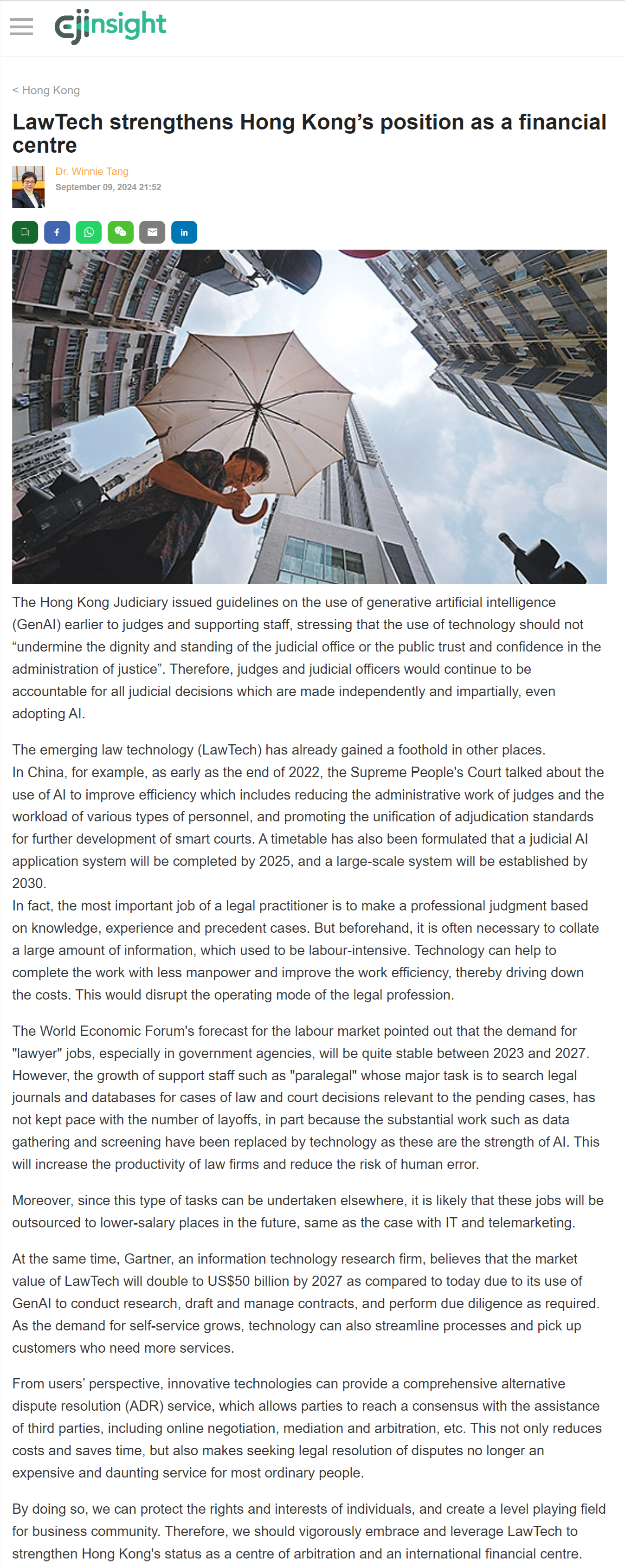網上版請按此

LawTech strengthens Hong Kong's position as a financial centre
The Hong Kong Judiciary issued guidelines on the use of generative artificial intelligence (GenAI) earlier to judges and supporting staff, stressing that the use of technology should not "undermine the dignity and standing of the judicial office or the public trust and confidence in the administration of justice". Therefore, judges and judicial officers would continue to be accountable for all judicial decisions which are made independently and impartially, even adopting AI.
The emerging law technology (LawTech) has already gained a foothold in other places. In China, for example, as early as the end of 2022, the Supreme People's Court talked about the use of AI to improve efficiency which includes reducing the administrative work of judges and the workload of various types of personnel, and promoting the unification of adjudication standards for further development of smart courts. A timetable has also been formulated that a judicial AI application system will be completed by 2025, and a large-scale system will be established by 2030.
In fact, the most important job of a legal practitioner is to make a professional judgment based on knowledge, experience and precedent cases. But beforehand, it is often necessary to collate a large amount of information, which used to be labour-intensive. Technology can help to complete the work with less manpower and improve the work efficiency, thereby driving down the costs. This would disrupt the operating mode of the legal profession.
The World Economic Forum's forecast for the labour market pointed out that the demand for "lawyer" jobs, especially in government agencies, will be quite stable between 2023 and 2027. However, the growth of support staff such as "paralegal" whose major task is to search legal journals and databases for cases of law and court decisions relevant to the pending cases, has not kept pace with the number of layoffs, in part because the substantial work such as data gathering and screening have been replaced by technology as these are the strength of AI. This will increase the productivity of law firms and reduce the risk of human error.
Moreover, since this type of tasks can be undertaken elsewhere, it is likely that these jobs will be outsourced to lower-salary places in the future, same as the case with IT and telemarketing.
At the same time, Gartner, an information technology research firm, believes that the market value of LawTech will double to US$50 billion by 2027 as compared to today due to its use of GenAI to conduct research, draft and manage contracts, and perform due diligence as required. As the demand for self-service grows, technology can also streamline processes and pick up customers who need more services.
From users' perspective, innovative technologies can provide a comprehensive alternative dispute resolution (ADR) service, which allows parties to reach a consensus with the assistance of third parties, including online negotiation, mediation and arbitration, etc. This not only reduces costs and saves time, but also makes seeking legal resolution of disputes no longer an expensive and daunting service for most ordinary people.
By doing so, we can protect the rights and interests of individuals, and create a level playing field for business community. Therefore, we should vigorously embrace and leverage LawTech to strengthen Hong Kong's status as a centre of arbitration and an international financial centre.
Dr. Winnie Tang
Adjunct Professor, Department of Computer Science, Faculty of Engineering; Department of Geography, Faculty of Social Sciences; and Faculty of Architecture, The University of Hong Kong